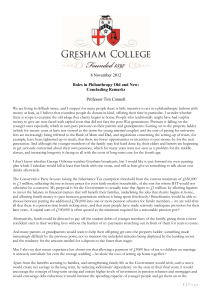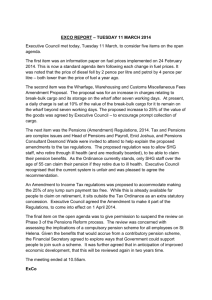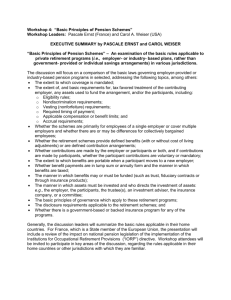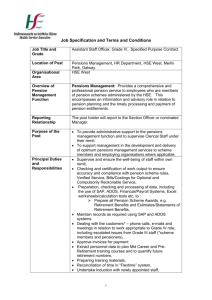Public Service Pensions Bill – Commentary
advertisement
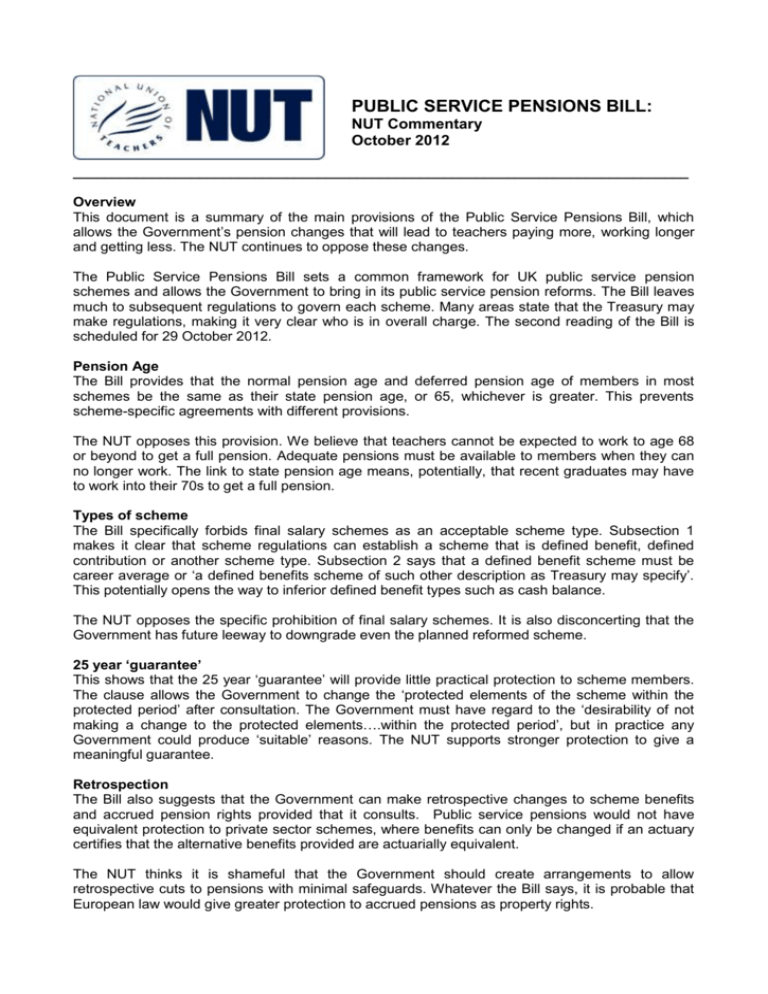
PUBLIC SERVICE PENSIONS BILL: NUT Commentary October 2012 ______________________________________________________________________________ Overview This document is a summary of the main provisions of the Public Service Pensions Bill, which allows the Government’s pension changes that will lead to teachers paying more, working longer and getting less. The NUT continues to oppose these changes. The Public Service Pensions Bill sets a common framework for UK public service pension schemes and allows the Government to bring in its public service pension reforms. The Bill leaves much to subsequent regulations to govern each scheme. Many areas state that the Treasury may make regulations, making it very clear who is in overall charge. The second reading of the Bill is scheduled for 29 October 2012. Pension Age The Bill provides that the normal pension age and deferred pension age of members in most schemes be the same as their state pension age, or 65, whichever is greater. This prevents scheme-specific agreements with different provisions. The NUT opposes this provision. We believe that teachers cannot be expected to work to age 68 or beyond to get a full pension. Adequate pensions must be available to members when they can no longer work. The link to state pension age means, potentially, that recent graduates may have to work into their 70s to get a full pension. Types of scheme The Bill specifically forbids final salary schemes as an acceptable scheme type. Subsection 1 makes it clear that scheme regulations can establish a scheme that is defined benefit, defined contribution or another scheme type. Subsection 2 says that a defined benefit scheme must be career average or ‘a defined benefits scheme of such other description as Treasury may specify’. This potentially opens the way to inferior defined benefit types such as cash balance. The NUT opposes the specific prohibition of final salary schemes. It is also disconcerting that the Government has future leeway to downgrade even the planned reformed scheme. 25 year ‘guarantee’ This shows that the 25 year ‘guarantee’ will provide little practical protection to scheme members. The clause allows the Government to change the ‘protected elements of the scheme within the protected period’ after consultation. The Government must have regard to the ‘desirability of not making a change to the protected elements….within the protected period’, but in practice any Government could produce ‘suitable’ reasons. The NUT supports stronger protection to give a meaningful guarantee. Retrospection The Bill also suggests that the Government can make retrospective changes to scheme benefits and accrued pension rights provided that it consults. Public service pensions would not have equivalent protection to private sector schemes, where benefits can only be changed if an actuary certifies that the alternative benefits provided are actuarially equivalent. The NUT thinks it is shameful that the Government should create arrangements to allow retrospective cuts to pensions with minimal safeguards. Whatever the Bill says, it is probable that European law would give greater protection to accrued pensions as property rights. Pensions Board The Bill states that there shall be a Pensions Board responsible for assisting the scheme manager on governance and administration of the scheme. There is nothing about consultative groups such as the Pension Policy Group suggested in the Hutton report. This type of detail is being left to the scheme-specific level to decide. The NUT welcomes the codification of scheme governance arrangements, as the recent scheme negotiations have demonstrated that the current informal arrangements hold no advantages. Revaluation This clause deals with the annual revaluation of pensions earned by serving members. It provides for this to be decided by an annual order made by the Treasury. However, unlike the 1971 Pensions (Increase) Act which governs annual pension increases for pensioners, the Bill allows pensions to be increased or decreased as specified by the Treasury. The Bill also states that the Treasury may determine the change in ‘such manner as the Treasury consider appropriate’ which is not consistent with the recent court verdict in the RPI/CPI judicial review which imposed greater restrictions on the Government’s freedom of action. The NUT believes that the revaluation guarantee should include a ‘no decreases’ provision so that active members’ pensions cannot be reduced. Actuarial valuations of public service pension schemes This clause sets out that schemes must be actuarially valued in accordance with Treasury directions on how and when a valuation is to be carried out and under what assumptions. The Bill gives no protection to members against unreasonable delay or unreasonable methodologies. The NUT believes that this is unfair and unreasonable. Employer Cost Cap The Bill requires scheme regulations to set an employer cost cap, and sets out how the cap should be set, measured and operated. The Treasury is in charge if it chooses to be, with the power to specify how the first valuation is carried out in setting the cap, and which costs are inside and outside the cap. The Treasury must require schemes to stay within specified margins either side of the employer cost cap and where a scheme would go beyond the margins, specify a cost target within the boundaries. The procedure that schemes would adopt where the costs would go beyond the margins is left to scheme regulations. Discussions between TUC representatives and Treasury on the cost control mechanisms have resulted in pensioner and deferred liability past service cost risks not being included in the employer cost cap or target. Treasury have recognised that inclusion of these costs would have led to greater volatility and thus a greater likelihood of breaching the employer cost cap. The NUT welcomes the Treasury’s recognition of the pressures that schemes face. Closure of existing pension schemes The Bill closes the existing schemes to future accrual from set dates (5 April 2015 for the TPS) and sets up the procedures for transitional protection. The Bill allows transitional protection to be framed by age and allows tapered protection up to 4 years beyond the full protection date. Final Salary Link The final salary link that applies to past service in final salary schemes prior to the closing date will be final salary at retirement rather than at scheme closure. The NUT notes that this form of explicit protection for continuous service has been included for the final salary link, but not for areas such as ill health retirement and redundancy protection. The NUT presumes the Government intends these to be dealt with at scheme level.

